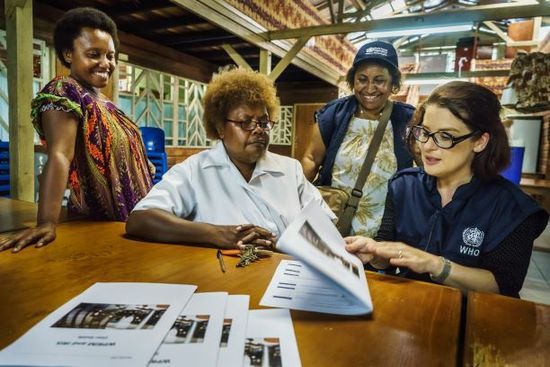
Health workers who clean health care facilities are the first line of defence against health care-associated infections (HAIs) and support efforts to reduce antimicrobial resistance (AMR).
Strengthening the training of this important group of health workers can contribute to resolving many of today’s public health challenges. This is important as the cleaning of both surfaces and hands is vital to control the transmission of HAIs.
The WHO training package entitled Environmental cleaning and infection prevention and control in health care facilities in low-and-middle-income countries (which comes in two parts including a Modules and resources pack https://iris.who.int/handle/10665/366380), specifically targets health workers who clean health care facilities and requires implementation by those who are trained to train. For this reason, trainers of trainers (ToT) are the focus of this course.
Photo credits: WHO / Yoshi Shimizu
Idioma: English
Health topic
Información del curso
Course overview: Effective infection prevention and control (IPC) measures prevent up to 70% of infections acquired in health care. IPC interventions are also massively cost beneficial in monetary terms and result in reduced human suffering, morbidity and mortality.
Environmental cleaning in health care facilities is one important component of IPC and is also crucial to improve the patient and staff experience and well-being in health care settings. Workers who routinely undertake environmental cleaning as their primary task are often not considered as part of the health workforce and are largely ‘invisible’.
Trained trainers are critical to delivering training to cleaners in order to build capacity through participatory adult learning approaches. ToT are health workers who have been identified to have the skills, competencies, experience and motivation to take on the role and these aspects run throughout the course. It is assumed that this course will be followed by someone who will deliver a ToT to an individual from a facility who in turn trains cleaners. However, direct delivery to cleaners by any experienced and informed trainer who has followed this course is also possible in order to support the effective implementation of the WHO training package.
Course duration: Approximately 1 hour
Certificates: A Confirmation of Participation is available to participants who complete 100% of the course materials.
Lo que aprenderá
- Describe the essential preparations for delivering the WHO training package to trainers of cleaning staff in health care facilities
- Identify the characteristics of a competent trainer of trainers, including how to undertake participatory adult learning and how to promote reflective learning in others
- Describe the aim and broad content areas of the WHO training package
- Explain the steps involved in implementing the WHO training package within health care facilities
- Identify and implement follow-up activities necessary for successful implementation of the WHO training package
- Demonstrate understanding of how to learn and reflect as a trainer of trainers.
Contenido del curso
Module 1: Introduction:
In this Module, you will be introduced to the purpose of the course, who it is for, and why the course is needed. It clearly outlines the characteristics of ToTs in order to set the scene for the remaining course modules. It also explains the rationale and purpose of the WHO training package, the focus of the course, how the WHO training package is structured and associated considerations. Finally, it concludes with an associated resources’ list.Module 2: How to learn and reflect:
In this Module, you will learn about how to take a proactive approach to learning during the course and how to reflect on learning. Upon completion of the Module, you will: describe the benefits of being ready to learn as a trainer of trainers; implement the questions which ensure your learning is successful and rewarding; demonstrate the meaning of ‘reflection’ in the context of learning and training.Module 3: How to prepare for training the trainers:
In this Module, a summary of information is provided about how to prepare for your role as a ToT in order that cleaners can ultimately be trained using the WHO training package. By the end of this module, you will: describe the minimum preparation required to deliver a trainer of trainers course; demonstrate the benefits of preparing in advance; explain the barriers that can be encountered when preparation is incomplete.Module 4: How and what to deliver in orientating trainers to the WHO training package:
In this Module, you will learn as a ToT what needs to be covered to orientate trainers to deliver the WHO training package split into parts: 1) how to deliver orientation of the WHO training package to trainers in health care facilities; and 2) the content (the ‘what to deliver¨’).Module 5: Considering follow-up actions to training of cleaners:
In this Module, you will learn about how to encourage active follow-up by trainers of cleaners post-training. Upon completion of the Module, you will : explain the barriers to the post-training implementation of best practices; explain the benefits of follow-up and the role of training as just one part of sustainability; describe the follow-up actions that trainers can undertake; state the resources available to support follow-up after training.Module 6: Reflective learning:
In this Module, you will focus on embracing reflection to enhance the learning experience, particularly during this online virtual learning course. You should also consider the benefits of sharing this approach with trainers as part of their approach when training cleaners. Upon completion of the Module, you will: examine the benefits of reflection as a trainer of trainers; implement your approach to and embracement of reflection; demonstrate how to plan for using reflection in action.
Matricularme en este curso
Requisitos para el certificado
- Obtenga una confirmación de participación al completar al menos el 100% del material del curso.
- Obtenga una insignia digitale abierta al completar el curso.